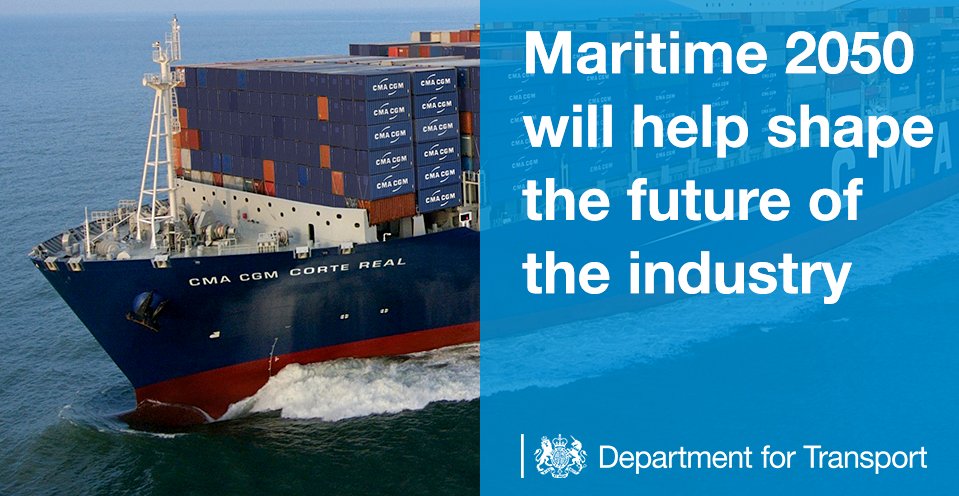

Chris
Grayling and Nus Ghani
<<<<
MAP - THE 2050 PLAN RECOMMENDATIONS
GLOSSARY
●● Bunkering refuelling a ship
●● CAS Clean Air Strategy
●● CCC Committee on Climate Change
●● CC(U)S Carbon Capture, (Usage) and Storage
●● CMC Clean Maritime Council
●● CO2 Carbon Dioxide
●● Domestic Shipping Ships which have come from a UK port and are making a call at
a different UK port. Domestic shipping for the purposes of the UK GHG inventory is defined
as any direct journey from a UK port directly to another UK port. In the case of shipping
between the UK and its overseas territories (e.g. Bermuda, Falklands Islands) these are
treated as a domestic journey for the sake of international reporting. International shipping
emissions are not included in the UK total greenhouse gas emissions, in line with United
Nations Framework Convention on Climate Change and Intergovernmental Panel on
Climate Change guidelines, however they are reported as a memo item in the UKs GHG
inventor95.
●● ECA Emission Control Areas (ECA)
●● GHG Greenhouse Gases
●● GVA Gross Value Added
●● H2 Hydrogen
●● HGV Heavy Goods Vehicle
●● IGF Code International Code of Safety for Ships Using Gases or Other Low-Flashpoint
Fuels
●● IMO International Maritime Organization
● International Shipping Ships calling at a UK port which have come from or are going
to an international destination.
● LNG Liquid Natural Gas
● Maritime 2050 A strategy setting out the Governments vision and ambitions for the
future of the British maritime sector, published January 2019.
● MARLab Maritime Autonomy Regulation lab
● MARPOL The International Convention for the Prevention of Pollution from Ships 1973
modified by the Protocol of 1978
● MarRI-UK Maritime Research and Innovation UK, a project aiming to provide
a collaborative innovation vehicle for the UK
maritime industry.
● MEPC Marine Environment Protection Committee
● MERAS Maritime Emissions Regulatory Advisory Service
● Negative Externalities When the fuel prices do not currently fully reflect the
environmental costs that result from the use of these fuels (e.g. climate change)
● NGO Non Governmental Organisation
● NH3 Ammonia
● NOx Nitrogen oxides
● NRMM Non-road mobile machinery
● PM2.5 & PM10 Particulate matter
● R&D Research and Development
● R&I Research and Innovation
● Red Ensign Group A group of British Shipping Registers, made up from: the
United Kingdom, the Crown Dependencies (Isle of Man, Guernsey and Jersey) and the
UK Overseas Territories (Anguilla, Bermuda, British Virgin Islands, Cayman
Islands, Falkland Islands, Gibraltar, Montserrat, St Helena and the Turks & Caicos Islands).
Any vessel registered in the UK, a Crown Dependency or UK Overseas Territory, is a
British ship and is entitled to fly the Red Ensign flag.
● Road to Zero Strategy A strategy outlining how Government will support the transition
to zero emission road transport and reduce emissions from conventional vehicles during
the transition, published July 2018.
● RTFCs Renewable transport fuel certificates
● RTFO Renewable Transport Fuel Obligation
● SCR Selective catalytic reduction
● Shipping in transit Ships which are not calling at a UK port but are passing through
UK waters.
● SO2 Sulphur dioxide
● T-TRIG Transport Technology Research Innovation Grant
● UK international shipping Ships calling at UK port which have come from or are going
to an international destination
● UN United Nations
● VOCs Volatile organic compounds (VOCs)
END NOTES
>>>>
SECTION 1 - TACKLING EMISSIONS
: 14
- 50
SECTION 2 - OUR APPROACH:
51 - 58
SECTION 3 -
ECONOMICS: 59 - 95
SECTION 4 -
INFRASTRUCTURE: 96 - 120
SECTION 5
INNOVATION: 121 - 129
SECTION 6 -
REGULATION: 130 - 138
SECTION 7 - NEXT
STEPS: 139 - 140
MAP - THE 2050 PLAN RECOMMENDATIONS
GLOSSARY
END
NOTES REFERENCE LINKS

Grant
Shapps - Secretary of State for Transport 2021
The
Knowledge Transfer Network is Innovate UKs network partner, and also provides innovation networking for other funders in line with its mission to drive UK growth.
The Department for Transport
works with
Innovate
UK, part of UK Research and Innovation Clean Maritime Plan and supports the transition to Net Zero by
2050 in line with the International
Maritime Organization's (IMO's)
targets for zero emission shipping.

LINKS
& REFERENCE
https://
Please use our
A-Z INDEX to
navigate this site



